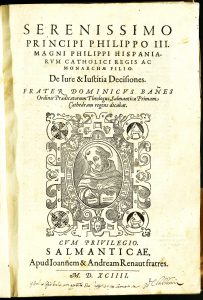 Domingo Báñez (1528-1604) gehört zu den bedeutendsten Autoren der Schule von Salamanca: der Schüler von Melchor Cano trat mit achtzehn Jahren in den Dominikaner-Orden ein und gehört zu den einflussreichsten spanischen Theologen des 16. Jahrhunderts. Mit „De Iure et Iustita Decisiones“ reiht er sich in die von Domingo de Soto begründete literarische Tradition ein und schafft ein zentrales Werk der spanischen Spätscholastik. Volltext und Digitalisate der Ausgabe 1594 in Salamanca entstandenen Ausgabe sind nun online im open access auf der Webseite des Projekts „Die Schule von Salamanca. Eine digitale Quellensammlung und ein Wörterbuch ihrer juristisch-politischen Sprache“ verfügbar.
Domingo Báñez (1528-1604) gehört zu den bedeutendsten Autoren der Schule von Salamanca: der Schüler von Melchor Cano trat mit achtzehn Jahren in den Dominikaner-Orden ein und gehört zu den einflussreichsten spanischen Theologen des 16. Jahrhunderts. Mit „De Iure et Iustita Decisiones“ reiht er sich in die von Domingo de Soto begründete literarische Tradition ein und schafft ein zentrales Werk der spanischen Spätscholastik. Volltext und Digitalisate der Ausgabe 1594 in Salamanca entstandenen Ausgabe sind nun online im open access auf der Webseite des Projekts „Die Schule von Salamanca. Eine digitale Quellensammlung und ein Wörterbuch ihrer juristisch-politischen Sprache“ verfügbar.
Die Schule von Salamanca. Eine digitale Quellensammlung und ein Wörterbuch ihrer juristisch-politischen Sprache ist ein gemeinsames Projekt der Akademie der Wissenschaften und der Literatur │ Mainz, des MPIeR und der Goethe-Universität Frankfurt.
